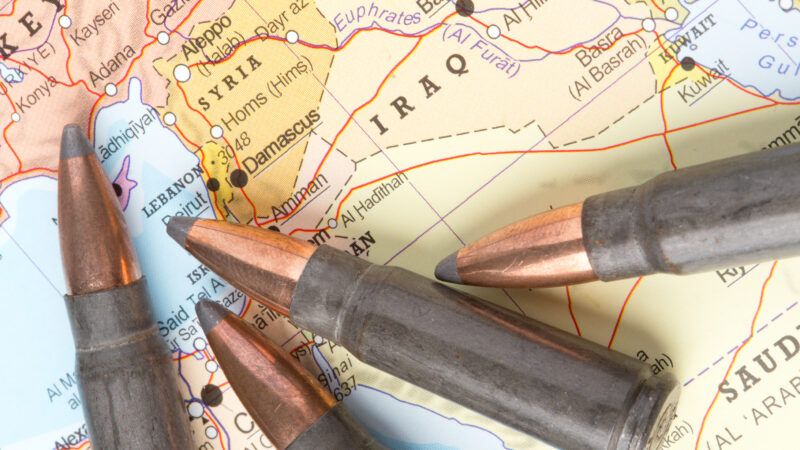Recent Airstrikes Are Our Periodic Reminder That We're Fighting a War in Syria
Four years after IS was officially defeated, the U.S. continues to keep hundreds of troops in Syria to fight the vanquished terrorist group.

It's easy to forget that the U.S. has hundreds of troops stationed in Syria whose official mission is to prevent the resurgence of the defeated Islamic State (IS) terrorist group. The American public received its periodic reminder of their presence when those troops were attacked by an "Iranian-backed militia" that's also dead set on preventing an IS resurgence.
Late last night, the Department of Defense (DOD) announced that one U.S. contractor was killed and five service members were injured when a drone of reported Iranian origin attacked a maintenance facility in northeastern Syria.
Defense Secretary Lloyd Austin said the U.S. launched retaliatory airstrikes against groups "affiliated with Iran's Islamic Revolutionary Guards Corps."
The U.K.-based Syrian Observatory for Human Rights said that U.S. air raids on three different militia posts in the country killed 11 fighters, reported Al Jazeera. Iranian state media claim the raids hit not military posts, but a rural development center and a grain facility.
"We will take all necessary measures to defend our people and will always respond at a time and place of our choosing," said Austin in a statement. "No group will strike our troops with impunity."
No group in Syria would even have the opportunity to strike U.S. forces if they weren't there. Given that IS lost its last piece of territory roughly four years ago, that would seem to eliminate the stated justification for maintaining an active anti-IS mission there.
The argument now is that we have to keep troops in Syria so that IS stays defeated.
"If you completely ignore and turn your back, then you're setting the conditions for a resurgence," Gen. Mark A. Milley, chairman of the Joint Chiefs of Staff, told The New York Times during a recent visit to Syria.
What exactly the U.S. interest is in further suppressing a rump remnant of a vanquished terrorist group goes unexplained. As yesterday's hostilities illustrate, a byproduct of keeping U.S. military personnel in Syria is that we periodically will bomb other forces who also have a keen interest in suppressing the return of IS.
Foreign policy experts and administration officials say that the "unofficial" reason U.S. troops have to stay in Syria is to forestall a fight for influence over the vacuum we'd leave behind.
"The way the experts and the administration see it, maintaining fewer than 1,000 troops in Syria is worth the occasional risk and minimal cost," reported Politico last year.
The recent deadly attack on U.S. forces shows that the cost is still not zero. One contractor won't be coming home to their family. Five other Americans are injured.
The frenzied diplomacy following yesterday's strikes illustrates how much risk there is for much greater loss of American lives. U.S. National Security Advisor Jake Sullivan put in an immediate call to the Qatari foreign minister, according to Qatari state media, who in turn was in contact with Iran's foreign minister in an attempt to prevent any escalation.
A similar tit-for-tat cycle of violence preceded the 2020 U.S. assassination of Iranian general Qasem Soleimani, which came very close to sparking a wider conflict between America and Iran.
It certainly doesn't seem like preserving a tiny sphere of influence in far-off Syria is worth the constant risk of U.S. casualties and America being plunged into a wider regional conflict with Iran. At a minimum, it would be nice to have an open, democratic debate about the pros and cons of keeping troops in Syria.
Regrettably, it seems like we won't ever get that debate.
Congress never voted to authorize U.S. hostilities in Syria, as the Constitution would seem to demand. Presidents Barack Obama, Donald Trump, and Joe Biden have all made war in that country on their own initiative.
A proposal from Sen. Lindsey Graham (R–S.C.) to authorize military force against Iranian-backed militias in Iraq was resoundingly voted down yesterday, notes Brianna Rosen at Just Security, "suggesting there may be little support for broadening authorities to Syria."
Direct U.S. military involvement in the region lumbers on as if on autopilot without any real democratic discussion or debate. Absent that debate, we can expect our contradictory presence in Syria to continue.
From that same Politico article last year: "No one we spoke to could describe the conditions under which U.S. troops could leave Syria. It's hard to predict when ISIS would be thoroughly unable to reconstitute its ranks or when the Iraqi government no longer needs cross-border help fending off Iranian militias, experts and officials said."
It would be unfair to call this a "forever war" in that the inevitable heat death of the universe will eventually end the possibility of kinetic action in Syria. Odds are we'll go back to forgetting it's happening until the next American gets killed, and/or it escalates very quickly.
Rent Free is a weekly newsletter from Christian Britschgi on urbanism and the fight for less regulation, more housing, more property rights, and more freedom in America's cities.


Show Comments (25)